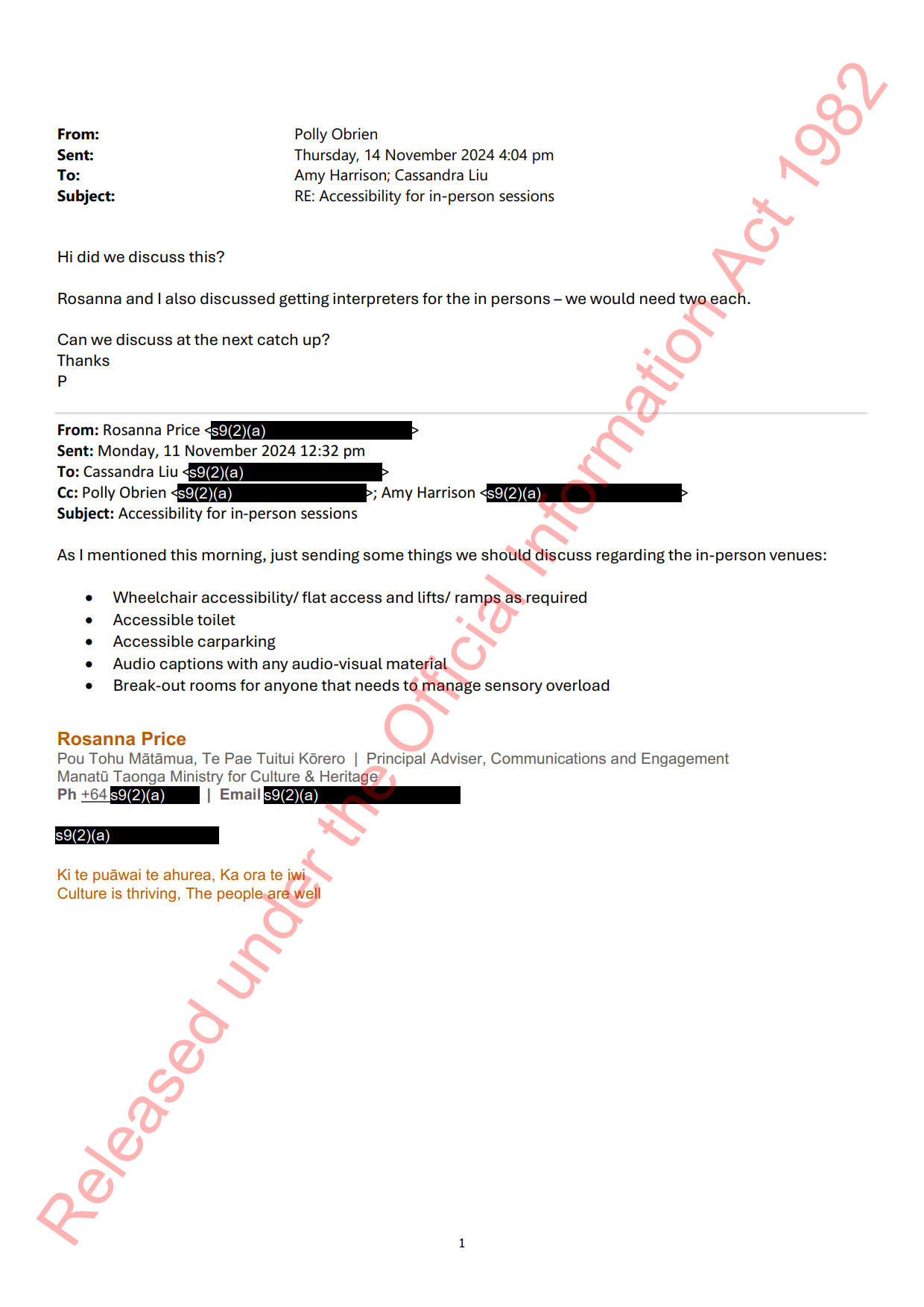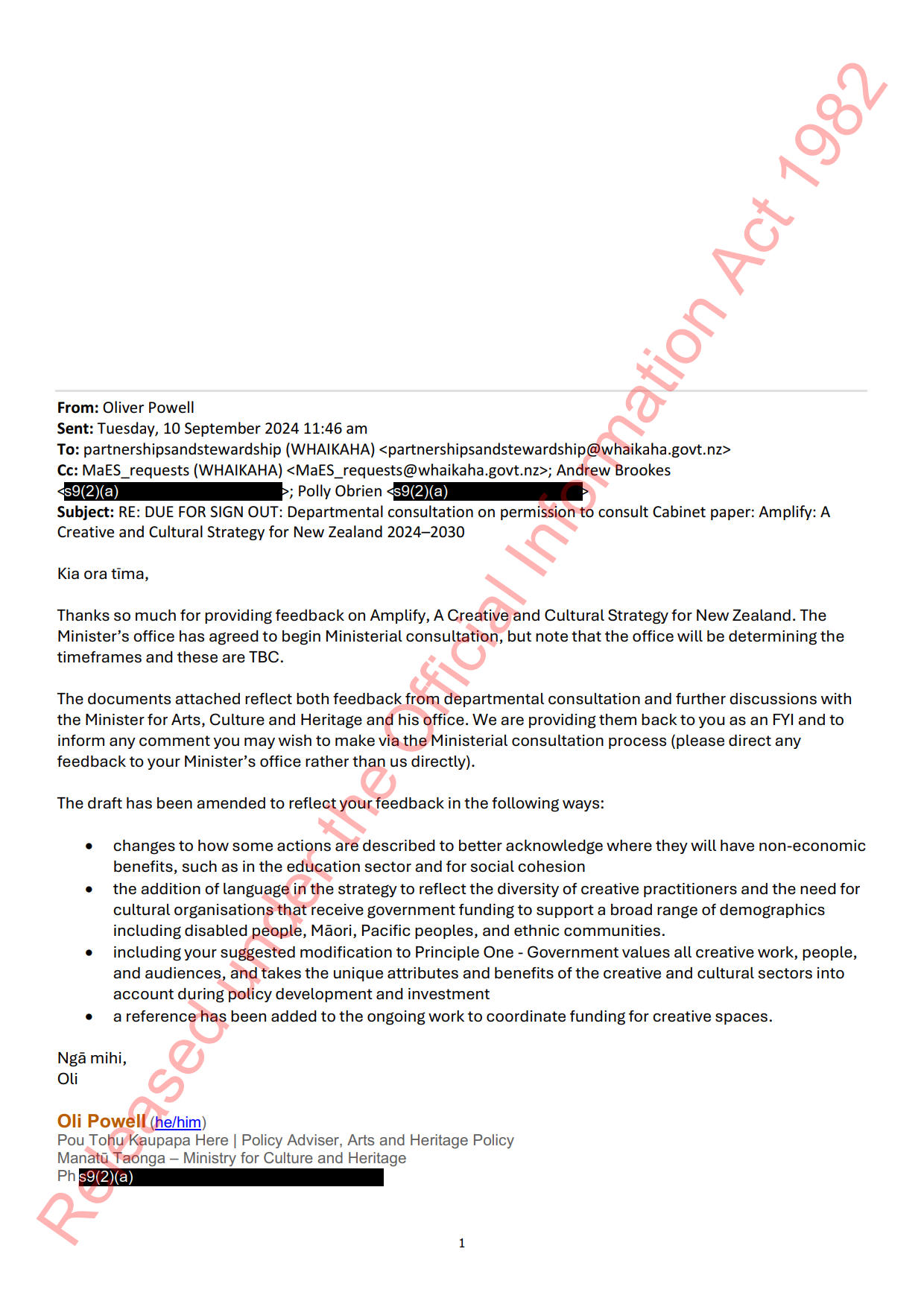
From: partnershipsandstewardship (WHAIKAHA) <[email address]>
Sent: Tuesday, August 20, 2024 7:40 AM
To: Oliver Powell <[email address]>
Cc: partnershipsandstewardship (WHAIKAHA) <[email address]>; MaES_requests
(WHAIKAHA) <[email address]>
Subject: FW: DUE FOR SIGN OUT: Departmental consultation on permission to consult Cabinet paper: Amplify: A
Creative and Cultural Strategy for New Zealand 2024–2030
Kia ora Oli,
The Ministry of Disabled People – Whaikaha (the Ministry), welcomes the opportunity to provide feedback on the
consultaƟon phase of the Cabinet Social Outcomes CommiƩee paper -
Amplify: A CreaƟve and Cultural Strategy for
New Zealand 2024–2030.
The Ministry supports public consultaƟon on the Strategy.
We would like to provide the below feedback, noƟng a lack of clarity within the Strategy on how accessibility will be
improved for populaƟon groups that experience barriers to accessing the arts and cultural sector. We would also like
to note that the omission of disability within the Strategy will likely be raised by disabled people and their
representaƟve organisaƟons during consultaƟon.
Accessibility
Equitable access to creaƟve and cultural spaces has long been of concern to the disability community. This includes
physical access to spaces, including the provision or accommodaƟon of accessibility supports, and improved access
to mainstream cultural events in the form of capƟoning, audio descripƟon services, and NZSL interpreƟng and
translaƟon.
The Strategy misses an opportunity to signal to disabled people that their parƟcipaƟon and contribuƟon to New
Zealand’s cultural landscape is valued. Disabled people, as both creators and parƟcipants of content, could be
included in all aspects of the Strategy by defining accessibility in a way that acknowledges and proposes soluƟons to
the barriers faced by disabled people.
This could be achieved by including equitable access for audience and pracƟƟoners alike as a guiding principle within
the Strategy. A modificaƟon of Principle One to more broadly define accessibility might read as follows:
Government values all creaƟve work, people, and audiences, and takes the unique aƩributes and benefits to New
Zealand society of the creaƟve and cultural sectors into account during policy development and investment.
There are a number of iniƟaƟves that could improve the accessibility of the arts and culture sector for disabled
people. Including this audience within the Strategy Principals, along with all pracƟƟoners, disabled and non-disabled
alike, allows greater opportunity to expand on how the acƟons within the Strategy can be met in a way that includes
the 48% of New Zealanders that do not find the arts easily accessible.
It is likely that the iniƟaƟves below will be raised by the disability community during the public consultaƟon phase of
the Strategy.
PeƟƟon of Hope CoƩon: Create legal capƟoning standards for New Zealand media
In November 2022 Hope CoƩon presented a peƟƟon to the House requesƟng that a requirement for capƟoning by
all television and media organisaƟons in New Zealand be put in place.
The Social Services and Community CommiƩee report on this peƟƟon included comments from the Ministry of
Culture and Heritage staƟng that the Ministry ‘acknowledged that New Zealand should aim to provide a high level of
capƟoning and audio descripƟons in media products [and that] this would mean that people who are blind, vision
impaired, deaf, or hard of hearing would be able to access media on an equal basis with others’, and that the
Ministry ‘intends to progress work on capƟoning and audio descripƟons, and the accessibility of modern forms of
media, as part of its review of the BroadcasƟng Act 1989’.
Released under the Official Information Act 1982
2
The 2017 select commiƩee inquiry into capƟoning in New Zealand also recommended that:
the provision of capƟoning content be a requirement for NZ On Air and Film Commission funding,
and that further progress be made in improving capƟoning access, including all plaƞorms from broadcast to
online content, and film screenings.
CreaƟve Spaces
In August this year the Minister for Arts, Culture and Heritage recommended to the Ministers of Mental Health,
Disability Issues and Social Development and Employment, and Children that their combined Ministries explore
opƟons to leverage Government funding to promote the efficacy of the arts in supporƟng beƩer social outcomes for
New Zealanders, with a parƟcular focus on creaƟve spaces (BR24/308 refers).
The creaƟve spaces environment scan found that creaƟve spaces, community arts organisaƟons that provide access
to art-making acƟviƟes for people who tradiƟonally experience barriers to parƟcipaƟon, deliver posiƟve outcomes
across a range of sectors including social development, health, mental health, disability, jusƟce (both adult and
youth rehabilitaƟon), and the arts as a whole.
Companion Cards
As part of the third Disability AcƟon Plan 2014-18, the Ministry for Culture and Heritage led AcƟon 12A -
InvesƟgate
the feasibility of introducing a companion card programme in New Zealand to reduce the cost barrier for disabled
people who require a companion to aƩend paid-entry acƟviƟes.
The resulƟng 2018 Briefing informed the then Associate Minister for Arts, Culture and Heritage that an esƟmated
50,000–100,000 disabled New Zealanders require a companion to aƩend paid-entry acƟviƟes and that that the
introducƟon of a companion card, which would allow discounted event entry for a companion, would be in-line with
other countries such as Australia.
While work on a New Zealand Companion Card has not progressed, the feasibility study found that the cost
associated with needing a companion was a barrier to disabled people accessing the arts and cultural acƟviƟes.
Strategic Pillar: InvesƟng Wisely
There is an opportunity within the Strategy to specify those populaƟon groups where investment will have social
and economic benefits. For example, collecƟng data on disabled people’s parƟcipaƟon in arts and cultural acƟviƟes,
and the economic benefits of improving accessibility to these acƟviƟes will further the acƟons under this Pillar.
ConsultaƟon Phase
We expect the disabled community will be interested in providing feedback on the Strategy. The DPO CoaliƟon are
well placed to provide well informed feedback. They can be contacted at: [email address]
ConsultaƟon (paragraph 19)
Please use Ministry of Disabled People – Whaikaha.
Ngā mihi
From: Oliver Powell <s9(2)(a)
>
Sent: Friday, August 2, 2024 4:28 PM
To: s9(2)(a)
Released under the Official Information Act 1982
3
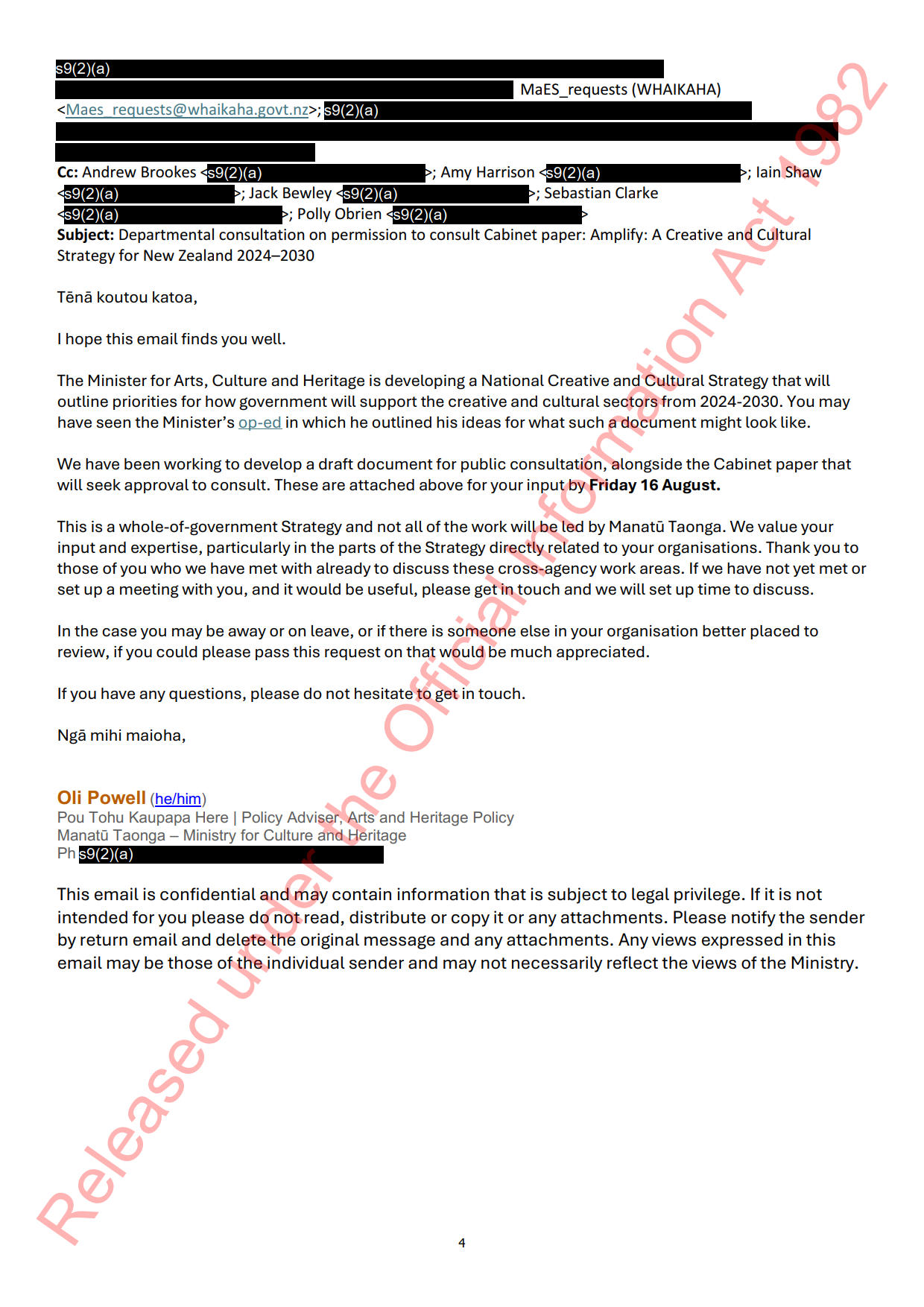
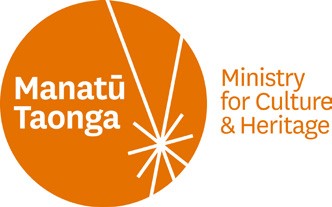 Hon Paul Goldsmith
Minister for Arts, Culture and Heritage
Proposed engagement plan for public consultation on Amplify: A Creative and Cultural
Hon Paul Goldsmith
Minister for Arts, Culture and Heritage
Proposed engagement plan for public consultation on Amplify: A Creative and Cultural
Strategy for New Zealand
Date:
20 September 2024
Priority:
Medium
Security
In Confidence
Reference:
BR24/437
classification:
Minister
Action Sought
Deadline
Hon Paul Goldsmith
Agree to the proposed engagement
30 September
Minister for Arts, Culture
approach for
Amplify: A Creative and Cultural 2024
and Heritage
Strategy for New Zealand
Contacts
Name
Position
Contact
1st Contact
Emily Fabling
Deputy Secretary Te Aka | Policy,
☐
Performance and Insights
Polly O’Brien
Manager Arts and Heritage Policy s9(2)(a)
☒
Minister’s office to complete
☐ Approved
☐ Declined
☐ Noted
☐ Needs change
☐ Seen
☐ Overtaken by events
☐ See Minister’s notes
☐ Withdrawn
Comments:
Released under the Official Information Act 1982
Purpose
1
Your agreement is sought to the proposed approach to public consultation on
Amplify:
A Creative and Cultural Strategy for New Zealand 2024-2030 (Amplify).
Key Messages
2
In your op-ed in the New Zealand Herald dated 17 April 2024, you committed to develop
a vision for the arts in consultation with the sector.
3
A Cabinet paper seeking agreement to public consultation on a draft strategy (
Amplify)
developed in response to this commitment is currently undergoing Ministerial
consultation.
4
The Ministry for Culture and Heritage has developed a consultation plan, based on
previous successful engagement. The approach includes a public survey, information
sessions and targeted workshops with key stakeholders delivered in partnership with
representative sector organisations.
5
This briefing seeks your endorsement of the consultation approach, in particular the
potential for some in-depth sessions to be held in person.
Recommendations
6
The Ministry for Culture and Heritage recommends that you:
1
Note that subject to Cabinet agreement, engagement will be
NOTED
conducted for a period of six weeks.
2
Agree that the proposed engagement approach includes:
YES / NO
• public introductory webinars
• in-depth workshops with targeted stakeholder groups
• formal input through a public survey.
3
EITHER [preferred option]
a
agree that targeted in-depth workshops can be held online or
YES / NO
in person if key stakeholders indicate this is their preference
OR
YES / NO
b
agree that targeted in-depth workshops will be held online.
BR24/437 Proposed engagement plan for public consultation on Amplify: A Creative and Cultural Strategy
2
for New Zealand
Released under the Official Information Act 1982
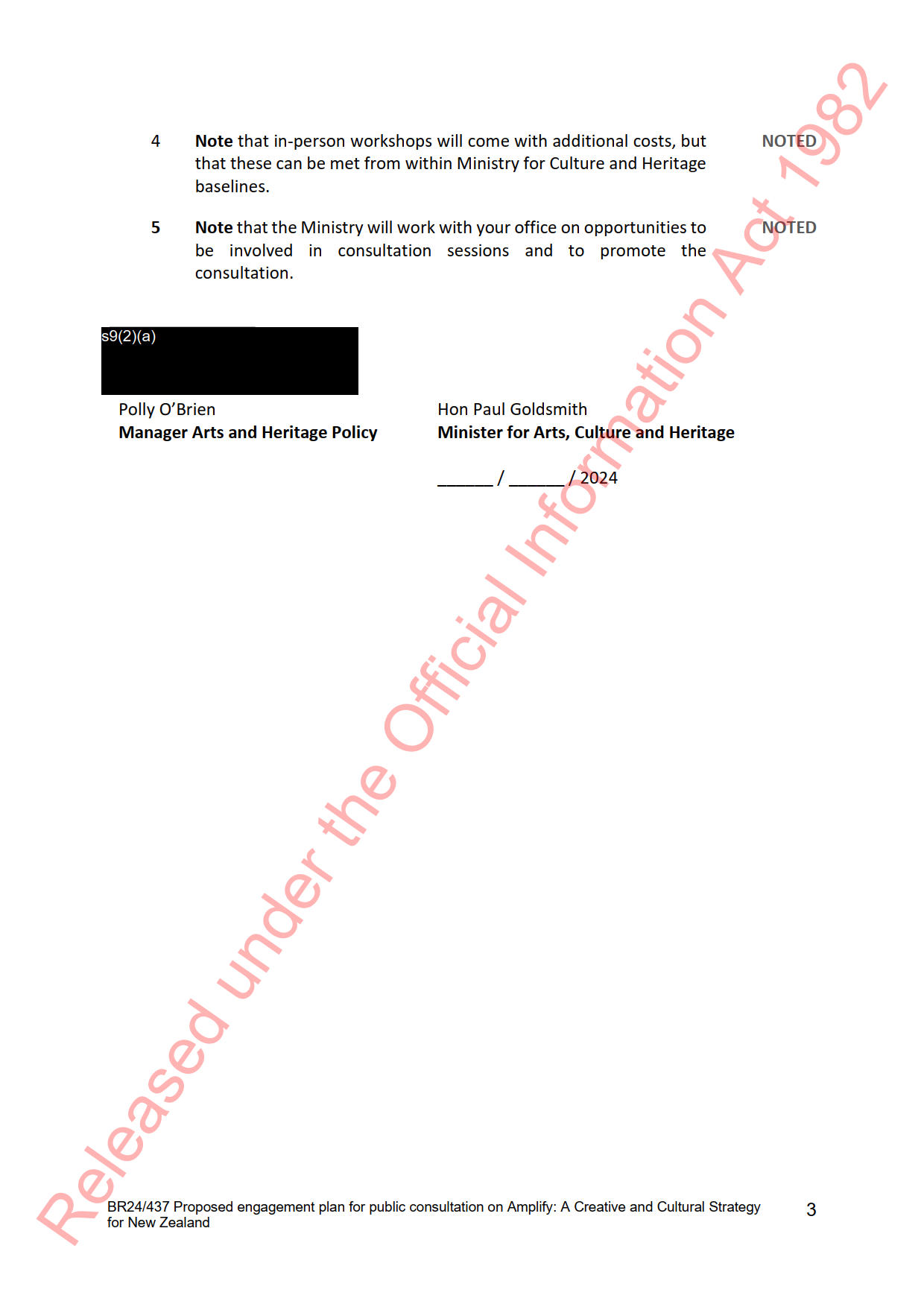
Background
7
In your op-ed in the New Zealand Herald dated 17 April 2024, you committed to develop
a vision for the arts in consultation with the sector.
8
A draft Creative and Cultural Strategy has now been developed at your request, to be
tested with the creative and cultural sectors and wider public through consultation. A
Cabinet paper seeking agreement to consult on the Strategy is scheduled to be tabled
in mid-October [BR24/415 refers].
9
Pre-consultation has been carried out with key organisations who would be involved in
organising the targeted element of consultation, including identifying attendees from
the relevant sub-sectors. These are summarised at
Appendix 1. Subject to your
agreement we will circulate invitations to targeted workshops in collaboration with
these groups. In addition, officials will meet with the Cultural Agency Chief Executives
group (CACE) to seek their feedback on the content of the strategy.
Summary of the consultation approach
10
Officials recommend that the engagement runs for six weeks. This is typical of
government consultation and will allow for officials to speak with a range of
stakeholders. A six-week consultation window will also provide the public with time to
read and consider the strategy and other consultation material before making
submissions. The proposed engagement approach includes:
a.
public introductory webinars summarising the strategy, providing a brief
opportunity for questions, and informing the public about the feedback
process
b.
in-depth workshops with targeted stakeholder groups to gather in-depth
insights from participants (see
Appendix 1)
c.
a public survey hosted on the Ministry website.
11
This approach has been used successfully by the Ministry in previous engagements,
including the design of COVID recovery funding and the Screen Sector Review, and was
well received by the sector. It can be delivered at minimal cost.
12
Hiring an external facilitator to run workshops was considered but has been ruled out
due to cost.
Your involvement in consultation
13
The Ministry will work with your office on opportunities for you to be involved in
consultation sessions, for example pre-recording an introductory message or attending
to introduce sessions. We can also work with your office on opportunities to promote
the consultation.
Released under the Official Information Act 1982
14
You have previously indicated your preference to discuss
Amplify at existing sector
events around the consultation period. A list of events you are already scheduled to
attend is at
Appendix 2. You may wish to discuss
Amplify at some or all of these events.
15
Note that the most likely events to offer rich feedback are broad sector events that
provide opportunities for open discussion. For example, you are already scheduled to
attend and give the keynote speech at the Wellington Heritage Festival on 21 October
2024. Some other events you are currently scheduled to attend provide limited
opportunities for this type of discussion.
16
The Ministry will continue to work with your office to identify opportunities for you to
engage with the creative and cultural sectors during the consultation period. Advice will
continue to focus on providing broad sector and geographic coverage, as well as
identifying further events with potential to provide depth of feedback.
17
Officials can attend events to support discussion of
Amplify, answer questions, and
ensure feedback from these discussions is included in summary material from
engagement (including report-back to Cabinet).
Potential for some targeted in-depth workshops to be held in person
18
In-depth workshops could be held online, or the Ministry could deliver a mixture of
online and in person sessions, working with sector partners to identify stakeholders who
may either prefer or only be reachable through an in-person workshop.
19
Table 1 below outlines potential benefits and risks of each option. Officials consider that
it would be helpful to offer an in-person option to be the most responsive to the needs
of each group.
Option A: All workshops online
Option B: Online, and option for in person
(preferred)
Benefits / advantages
Benefits / advantages
• No travel costs
• Some people can provide feedback who
might not otherwise be reached
• Ministry has previously used this model
• Opportunity for focus on local issues
• Allows more staff to support sessions
• More culturally appropriate for Māori and
• Lower time cost for attendees
Pacific communities
Risks / disadvantages
Risks / disadvantages
• Potentially less depth of feedback
• Some sectors with activity spread across
regions may not prefer this option, or may
• Accessibility issues for those who experience
ask for multiple sessions or for travel costs to
difficulties with online meetings
be reimbursed
BR24/437 Proposed engagement plan for public consultation on Amplify: A Creative and Cultural Strategy
5
for New Zealand
Released under the Official Information Act 1982
• Can be harder to moderate dominant voices • If not supplemented by online material,
could reach fewer people overall
• Incurs accommodation and travel costs (note
these can be managed to be low cost and
met within baselines).
Consultation
26
Public consultation will enable members of the public, particularly the creative and
cultural sectors, to have input into the drafting of the final version of
Amplify.
27
Previous advice to you has outlined the feedback received from departmental
consultation on the
Amplify draft and how it has been reflected in the current draft
[BR24/382 refers].
Financial implications
28
Consultation costs will be managed to be low cost and funded from within Ministry
baselines.
Next steps
29
An updated timeline for public consultation is outlined in the table below.
Milestone
Date
Ministerial consultation ends
27 September 2024 [TBC]
Lodgement for Cabinet consideration
10 October 2024
Social Outcomes Committee
16 October 2024
Cabinet approval to consult
21 October 2024
Public consultation [all dates indicative]
28 October – 6 December 2024
•
Introductory webinars
28 October – 10 November 2024
•
Deep-dive sessions
11 – 29 November 2024
•
No sessions – time allowed for public to 30 November – 6 December 2024
consider and make submissions
Submissions analysis
December 2024 – January 2025
Report back to Cabinet
February 2025
BR24/437 Proposed engagement plan for public consultation on Amplify: A Creative and Cultural Strategy
6
for New Zealand
Released under the Official Information Act 1982
Appendices
Appendix 1: Planned in-depth workshops and key collaborators
Appendix 2: Upcoming Ministerial engagements relevant to
Amplify
BR24/437 Proposed engagement plan for public consultation on Amplify: A Creative and Cultural Strategy
7
for New Zealand
Released under the Official Information Act 1982
Appendix 1: Planned in-depth workshops and key collaborators
Note that additional sessions can be arranged with other organisations on request.
Sector
Key collaborator/s1
Arts, including visual art, music, performing art,
Regional Arts Network Aotearoa (RANA) and
literature
associated regional arts organisations
WeCreate
CNZ
Music Commission
Coalition for Books and associated
organisations e.g. PANZ, NZ Society of
Authors
NZ On Air
Te Māngai Paho
Other funded entities, e.g. NZ Film
Commission, NZSO, NZ Ballet, Te Matatini
Copyright Licensing NZ
Performing Arts Network of NZ
Art Makers Aotearoa
Tautai Contemporary Pacific Arts Trust
The Big Idea
Arts Foundation
APRA AMCOS
Music Producers Guild
Ethnic, Arts and Trade Foundation
Satellites (Aotearoa Asian art)
Toi Iho Charitable Trust
NZ Comedy Trust
Arts and wellbeing, including disability and mental
Arts Access Aotearoa
health
Health / mental health bodies, e.g. Mental
Health Foundation
Te Ora Auaha
Audio Described Aotearoa
Arts education
Toi Mai
Ministry of Education
Universities, polytechnics and other post-
secondary organisations
Teacher representative organisations e.g.
PPTA
Education NZ
Centre for Arts and Social Transformation
Drama NZ
Community and regional arts
RANA and associated regional arts
organisations
Local Government NZ
Councils, particularly those that are
significant funders of creative and cultural
activity e.g. Auckland Council
1 Note this is the current indicative plan and is subject to change. The stakeholder list is not exhaustive.
BR24/437 Proposed engagement plan for public consultation on Amplify: A Creative and Cultural Strategy
8
for New Zealand
Released under the Official Information Act 1982
Creative industries, e.g. fashion, gaming, design,
WeCreate and member groups e.g. SPADA,
screen
NZ Game Developers Association
Vote Media and Communications funded
entities, e.g. NZ on Air, NZ Film
CommissionTe Māngai Paho
CDIP Steering Group agencies, e.g. NZ Story,
NZTE, Education NZ
Screen Guild
Ngā Aho Whakaari
National Digital Forum
Entertainment Venues Assoc. NZ
Entertainment Technology NZ
Galleries, libraries, archives and museums (GLAM)
Museums Aotearoa and its membership
Public Art Gallery Directors
Te Papa Tongarewa
Individual museums, e.g. Auckland Museum
National Library
MCH funded entities e.g. Ngā Taonga Sound
and Vision
National Digital Forum
Heritage
Heritage NZ Pouhere Taonga
Historic Places Aotearoa
ICOMOS New Zealand
New Zealand Archaeology Association
Ngā toi Māori
Toi Māori Aotearoa including committees
for toi Māori subsectors, e.g. rāranga, ta
moko, puoro
Ngā Aho Whakaari
Te Māngai Paho
Kāhui Kaitiaki
Māoriland Film Festival
Māori Music Industry Coalition
Māori councils and representative groups
within other bodies e.g. PANZ
Toi Iho Charitable Trust
Note we would also offer opt-in meetings to
PSGEs
BR24/437 Proposed engagement plan for public consultation on Amplify: A Creative and Cultural Strategy
9
for New Zealand
Released under the Official Information Act 1982
From:
accessibility (MSD) <[email address]>
Sent:
Wednesday, 6 November 2024 2:23 pm
To:
Rosanna Price
Cc:
Amy Harrison; Polly Obrien
Subject:
RE: Quote please for NZSL and Easy Read format
IN-CONFIDENCE
Kia ora Rosanna,
Thank you for providing the information in your email below regarding Alternate Formats.
We recommend strongly that for information which is going to be translated, it is done in all 5
Alternate Formats, which are: Easy Read, New Zealand Sign Language, Braille, Large Print and
Audio.
In terms of translating a 39 page document, we generally find that long documents like that are
appropriate for the blindness formats (Braille, Audio and Large Print) but not for Easy Read and
New Zealand Sign Language.
This is because it can become an incredibly long Easy Read document, and a very long NZSL
video, which can be difficult for audiences to work through and may mean that some of the
information becomes inaccessible for users.
You can read through this page: Guide to requesting Alternate Formats - Ministry of Social
Development which gives you information on timeframes for work as well as the process for
requesting.
If you are wanting to proceed with a request, we require a completed request form alongside your
document(s) which you can find here: Form for requesting alternate formats - Ministry of Social
Development.
We would generally recommend a 4-7 page summary be produced in all 5 formats, and the full
document be produced in the blindness formats, though we understand budgets may impact
whether that can happen, it is ideal to plan to include all formats as much as possible.
In regards to costings, providers can produce costings once we have documents to send them for
the advice and costings stage – this can take up to 10 working days, and quotes will be sent
directly to the contact person in the request form.
I am more than happy to answer any additional questions you may have or to discuss the process
further if you need.
Ngā mihi,
Briony Tustanowski – Ia/She/Her
Advisor, Alternate Formats Partnerships and Services
Waea Pūkoro: s9(2)(a)
Released under the Official Information Act 1982
1
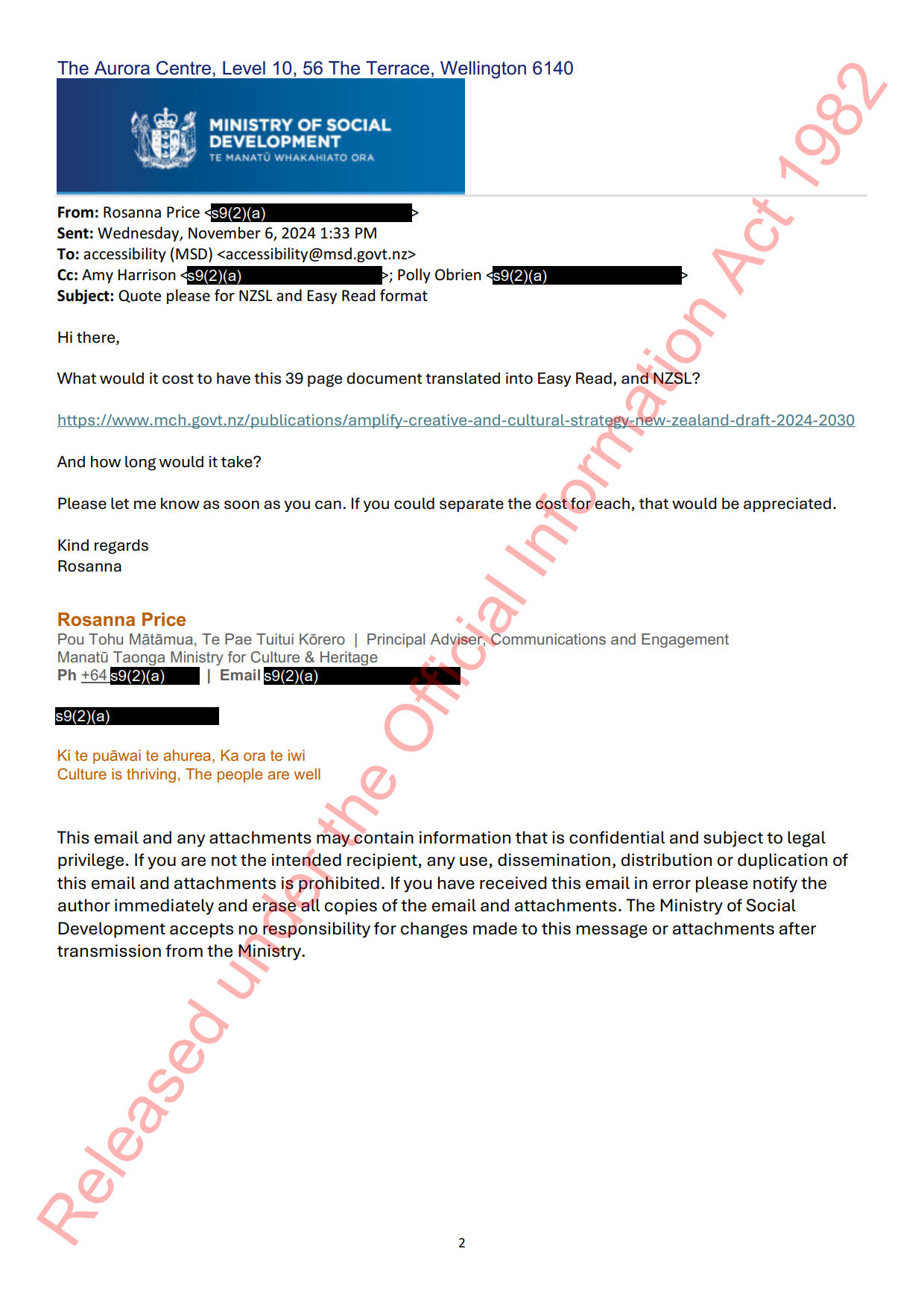
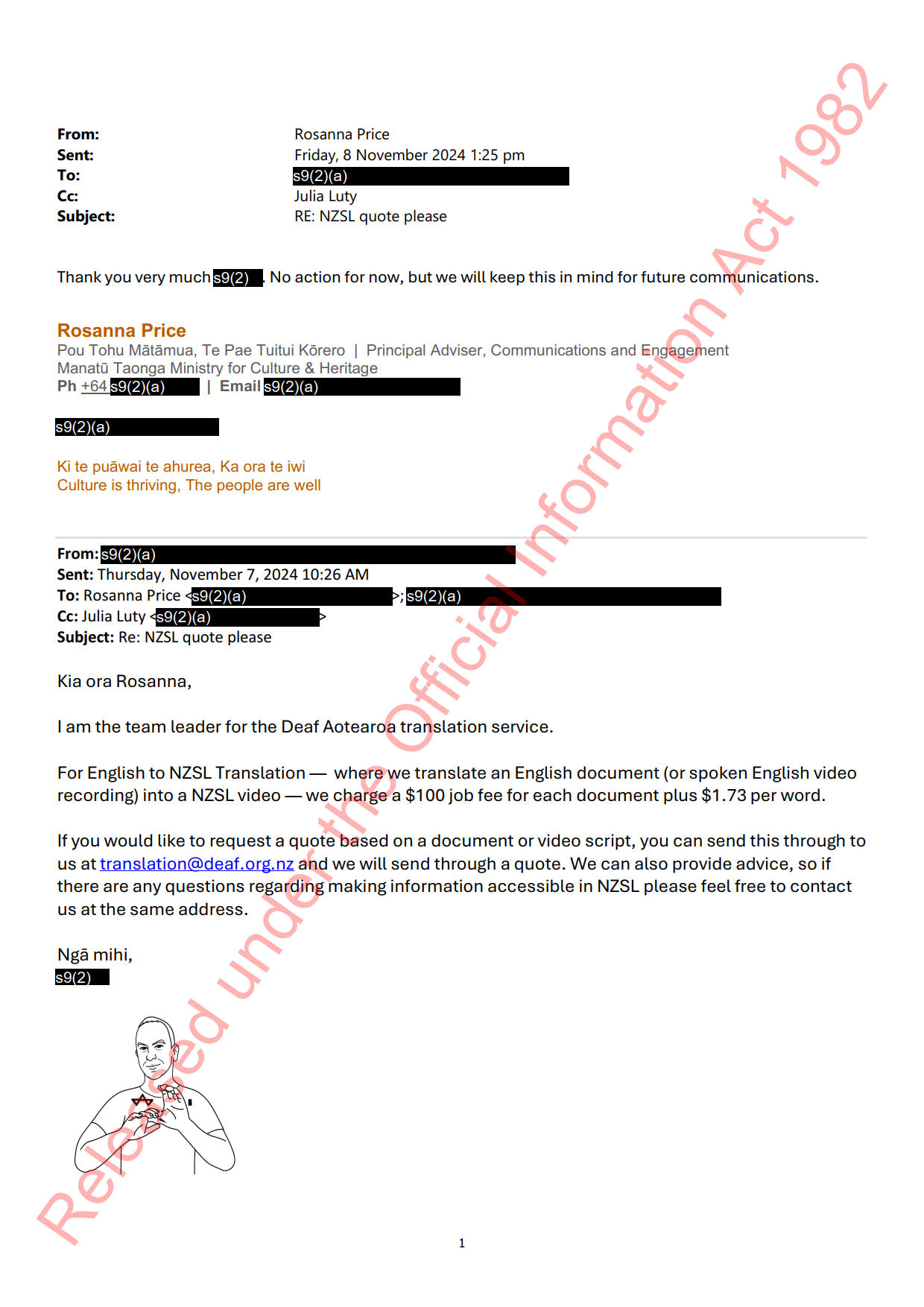
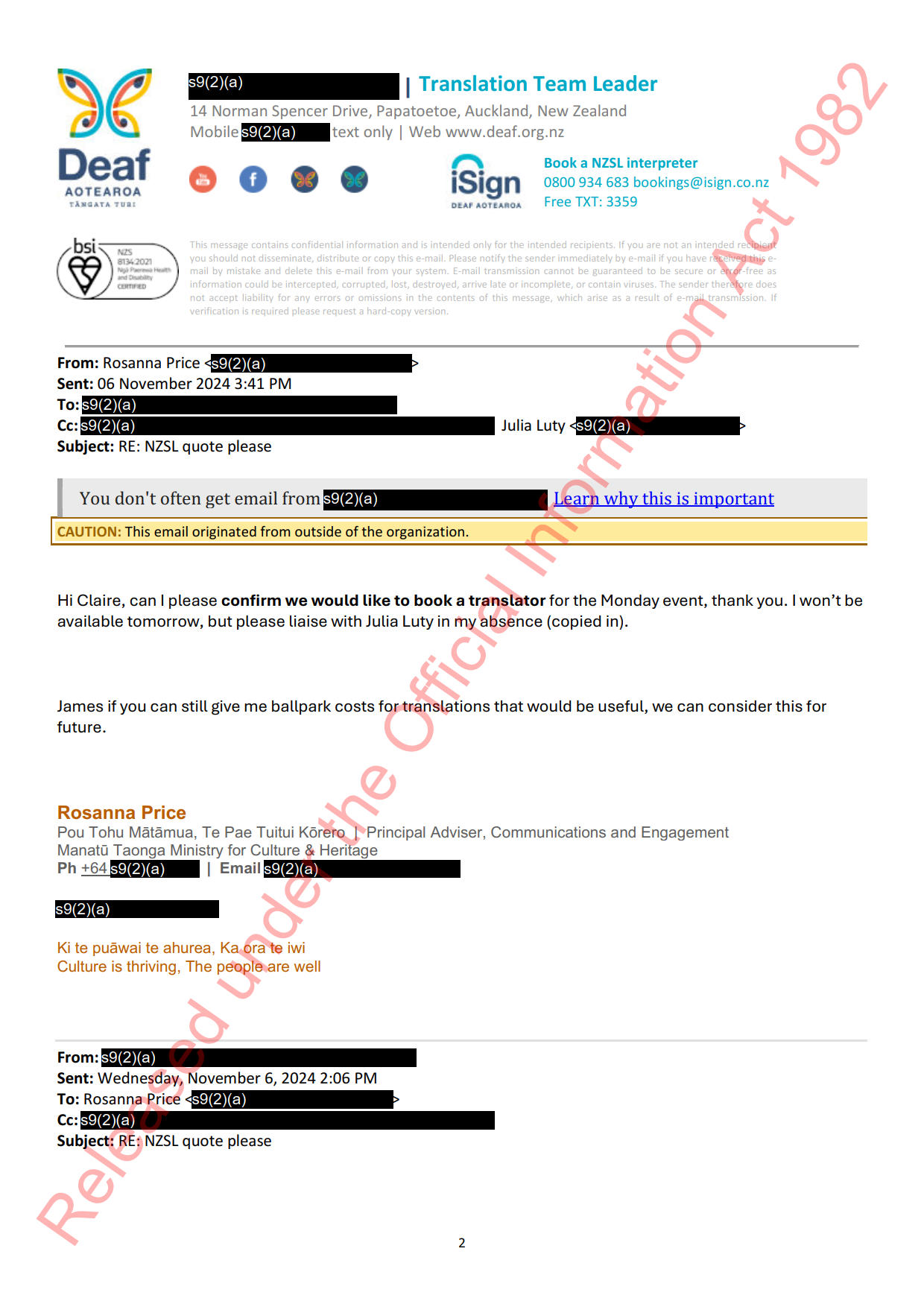
Hi Rosanna
Thank you for your email.
Please find attached an estimate detailing the cost of having one interpreter present at your information
session on Monday 11 November.
I have cc’ds9(2)(a)
into this email as he can provide you with an estimate for the translation
service.
If you do find out that there are Deaf attendees and you would like to have an interpreter online for your
session on Monday, can you please let me know as soon as possible in order to check interpreter availability?
Many thanks
Regards
s9(2)
(a)
From: iSign Bookings <[email address]>
Sent: Wednesday, 6 November 2024 1:30 pm
To: s9(2)(a)
Cc: s9(2)(a)
Subject: Fw: NZSL quote please
Hi Rosanna
Thank you for your request for an interpreter , I have included one of our team s9(2) in this message
& will be coordinating this booking for you should you have any questions”.
(a)
Have also included our translation team leader s9(2)(a)
related to your request for
translation estimate
Thanks
Released under the Official Information Act 1982
3
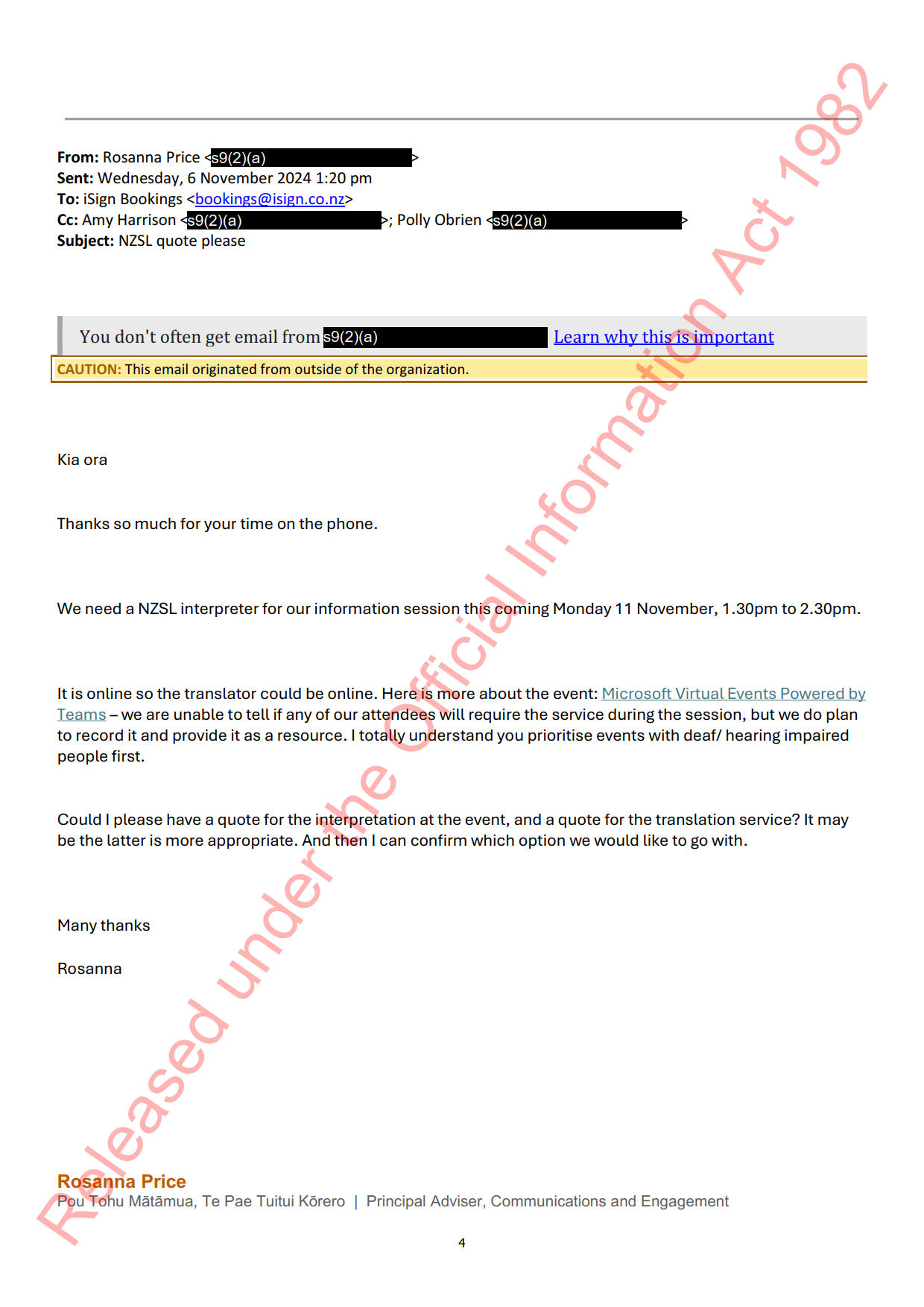
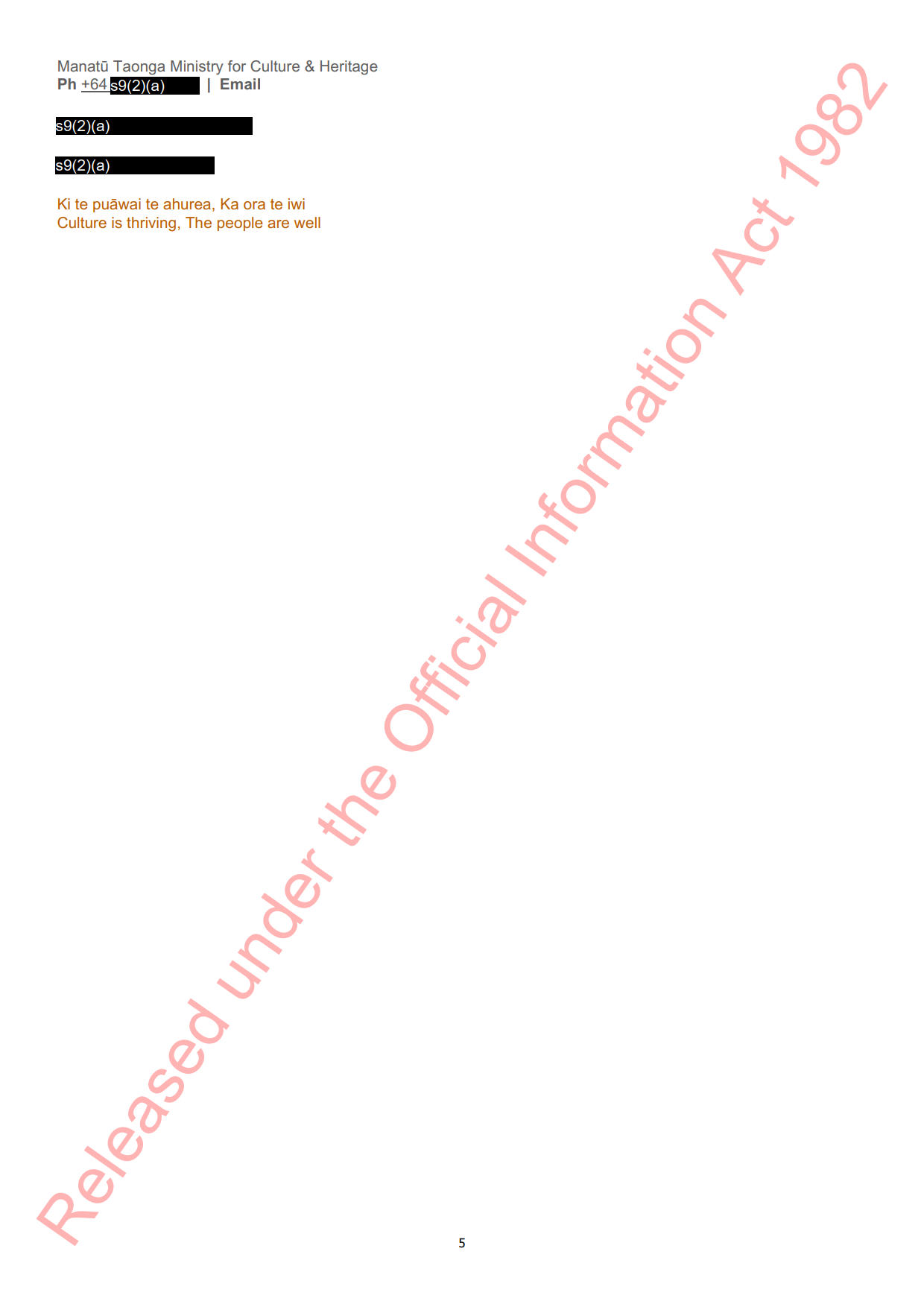
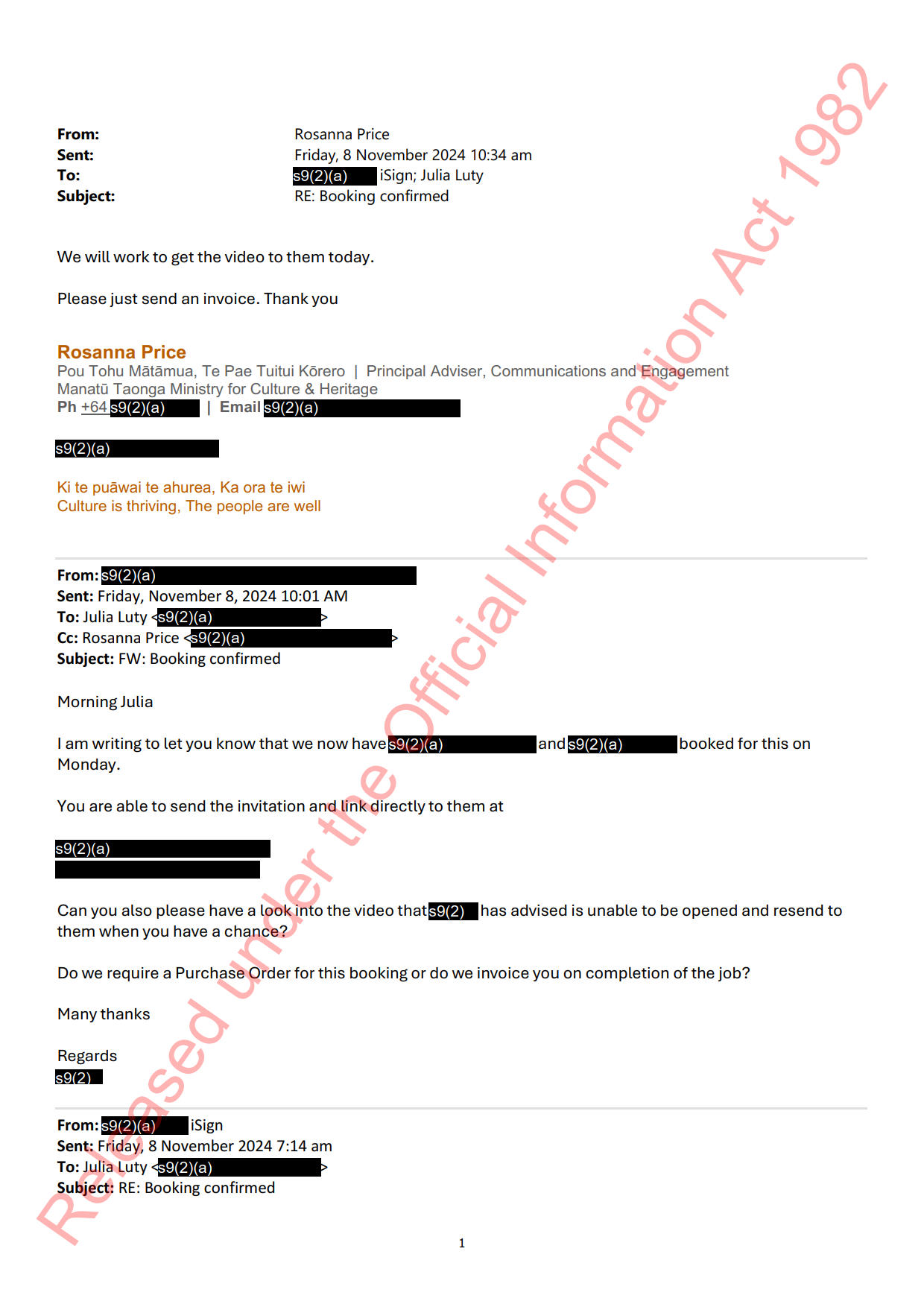
Hi Julia
s9(2)(a) email address is s9(2)(a)
. As per my previous email, however
s9(2)
is asking for this booking to be teamed with another interpreter. If you can please let me know if you
consent to
(a)
have two interpreters for this booking as soon as possible?
Thanks
s9(2)
(a)
From: Julia Luty <s9(2)(a)
>
Sent: Thursday, 7 November 2024 3:34 pm
To: s9(2)(a)
iSign <s9(2)(a)
>
Subject: RE: Booking confirmed
CAUTION: This email originated from outside of the organization.
Thankss9(2) If you could please pass on the interpreter’s email address I will ask the team here to send them
the invite.
(a)
Ngā mihi
Julia
From: s9(2)(a)
iSign <s9(2)(a)
>
Sent: Thursday, 7 November 2024 12:25 pm
To: Julia Luty <s9(2)(a)
>
Subject: RE: Booking confirmed
Hi Julia
That’s great, thank you for that.
Is there is a link for the meeting or do you need to send this to the interpreter directly?
Thanks
s9(2)
(a)
From: Julia Luty <s9(2)(a)
>
Sent: Thursday, 7 November 2024 11:26 am
To: s9(2)(a)
iSign <s9(2)(a)
>; Rosanna Price <s9(2)(a)
>
Subject: RE: Booking confirmed
CAUTION: This email originated from outside of the organization.
Wonderful, thanks you so muchs9(2)
(a)
Please see attached in confidence the presentation to help prepare the interpreter.
There is also a Minister’s video which can be viewed below. Note the video will be played to open the
presentation. I had to separate it out from the slide pack due to file size.
https://we.tl/t-72IXhTraVf
Released under the Official Information Act 1982
2
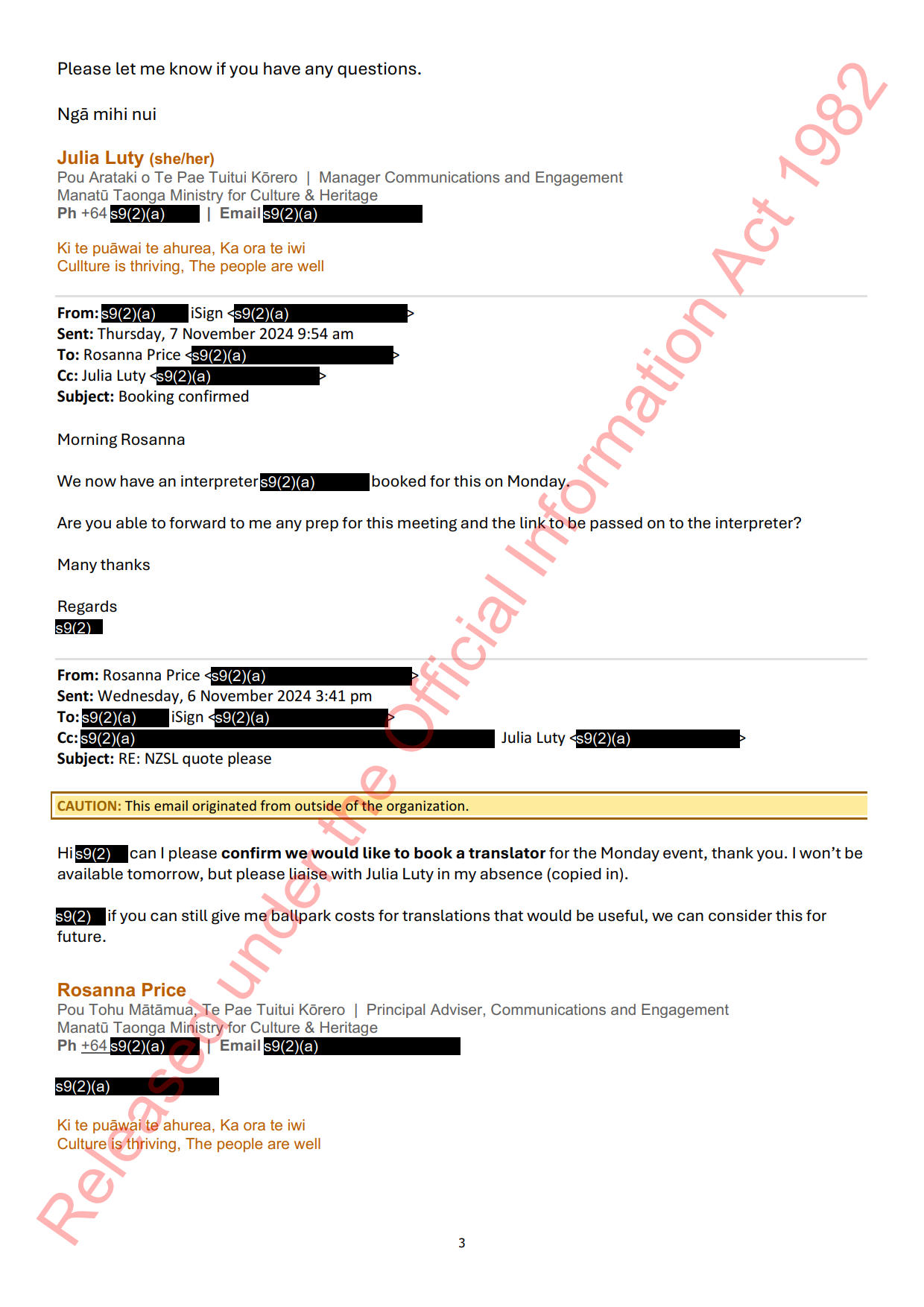
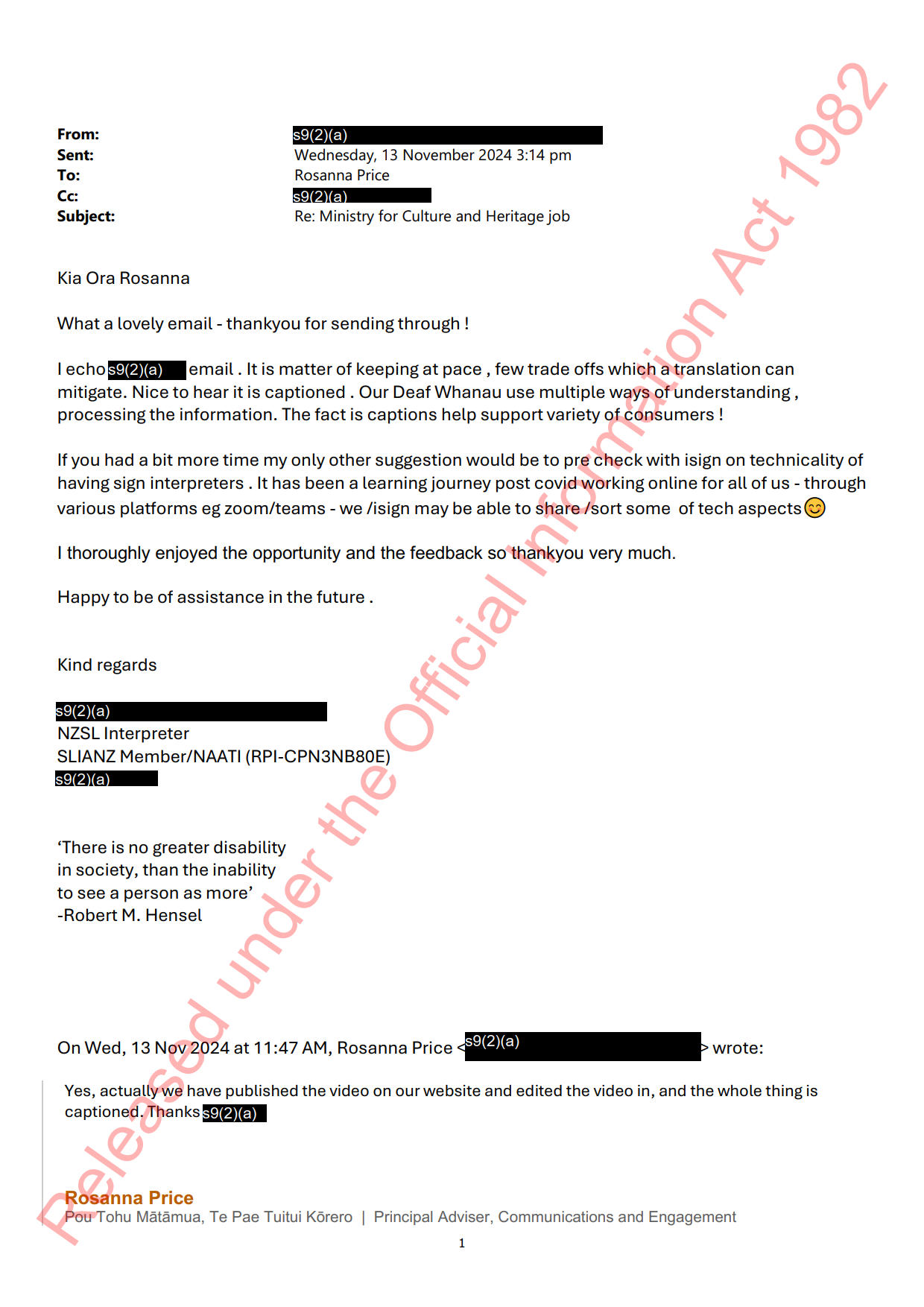
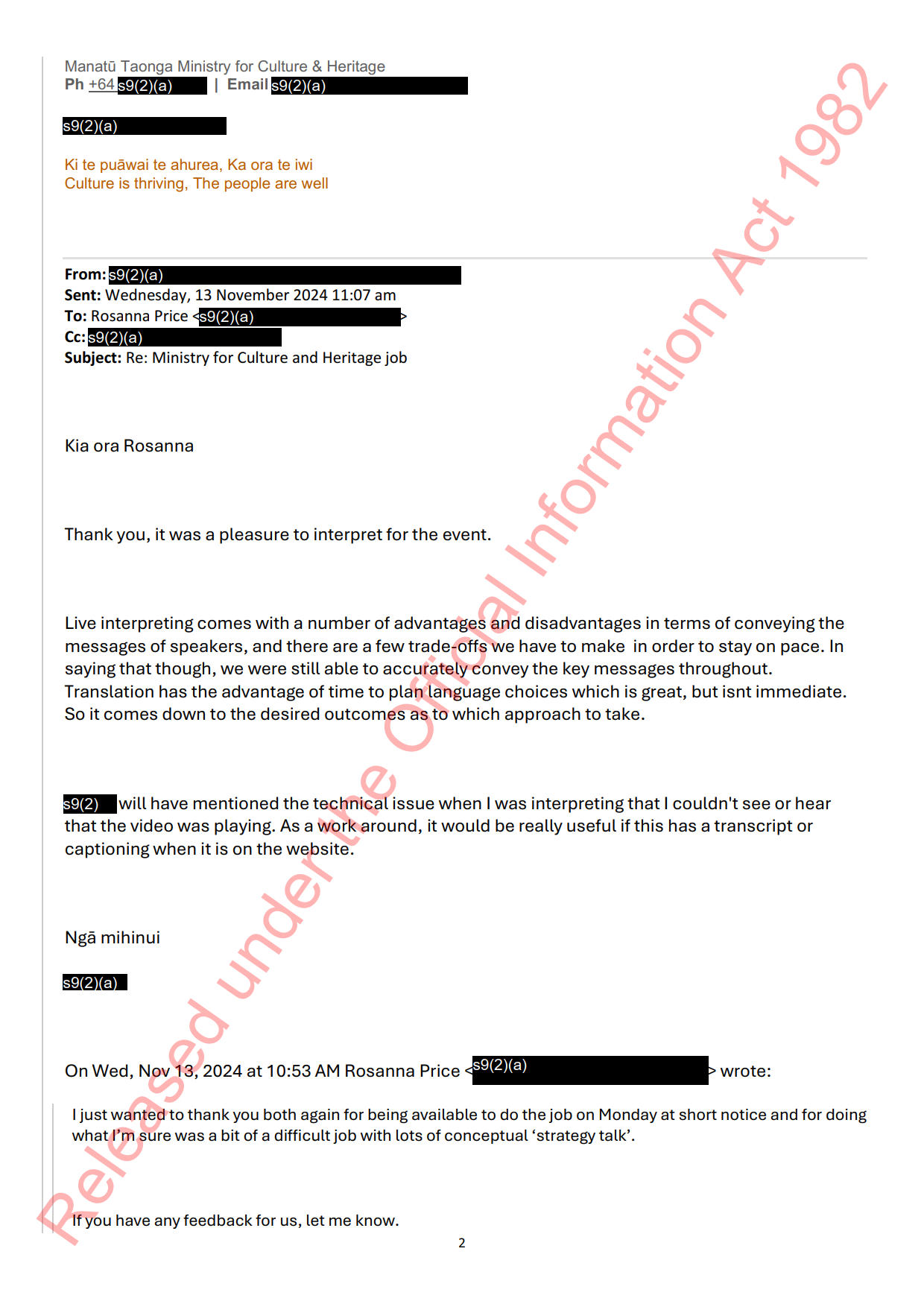
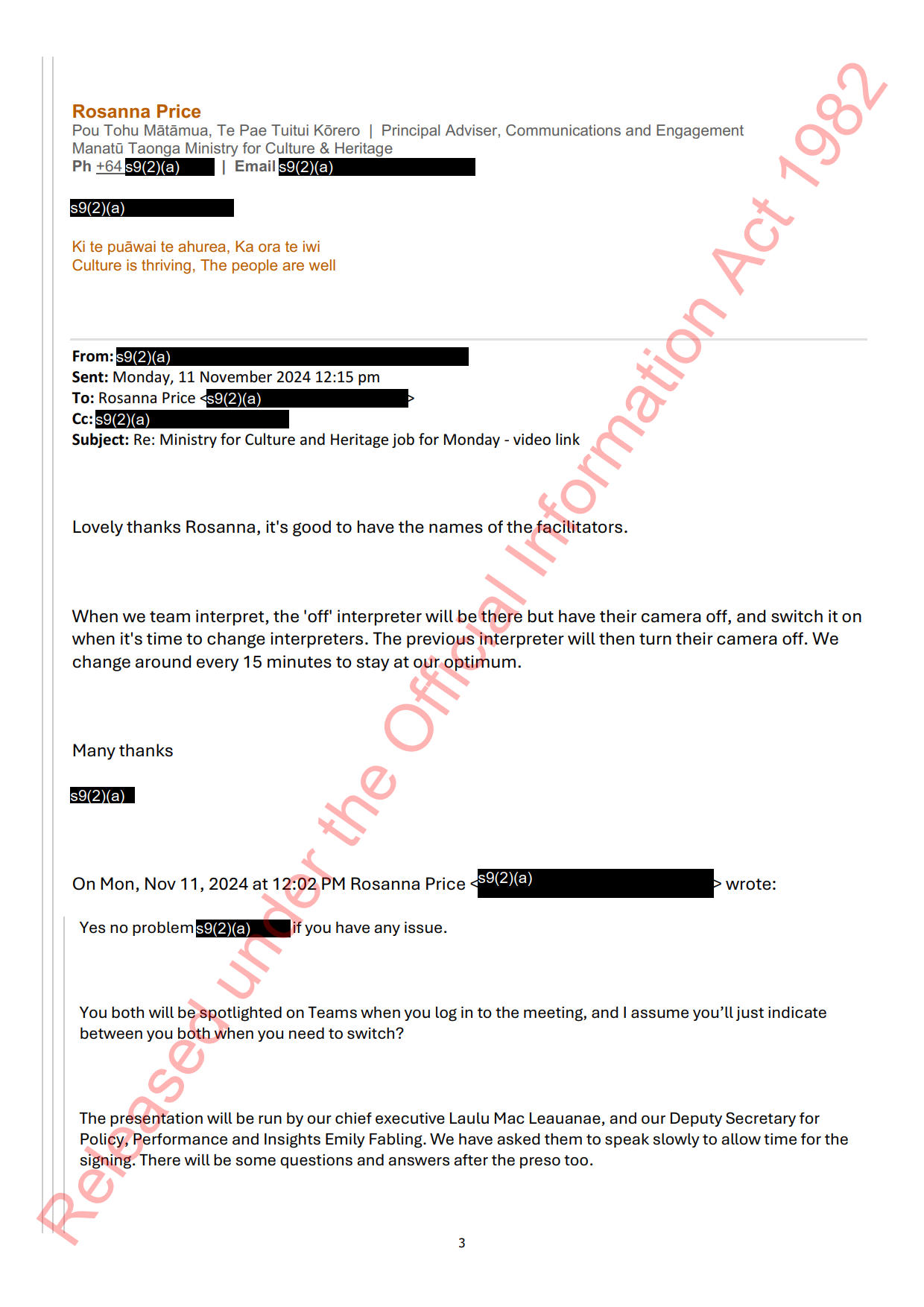
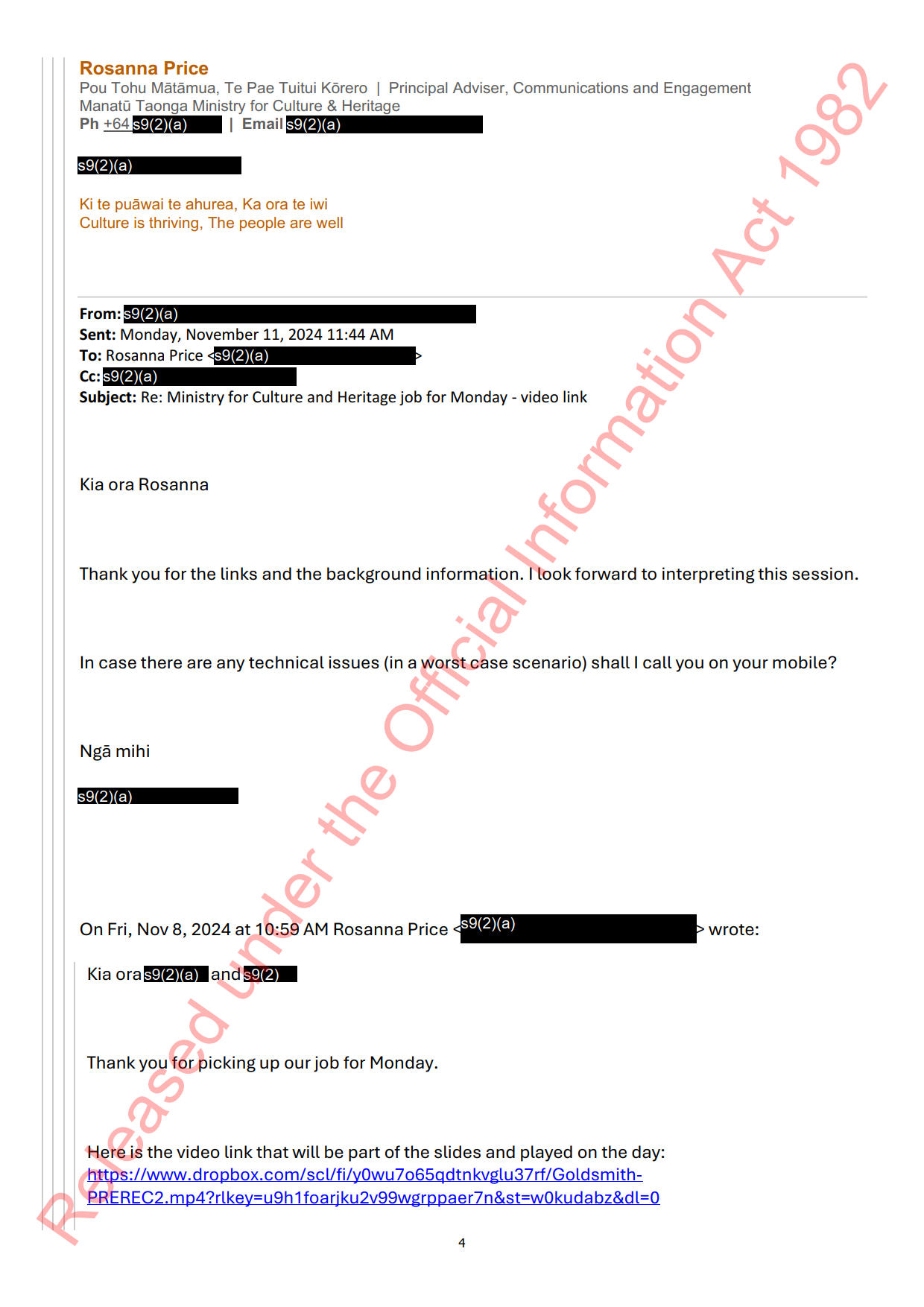
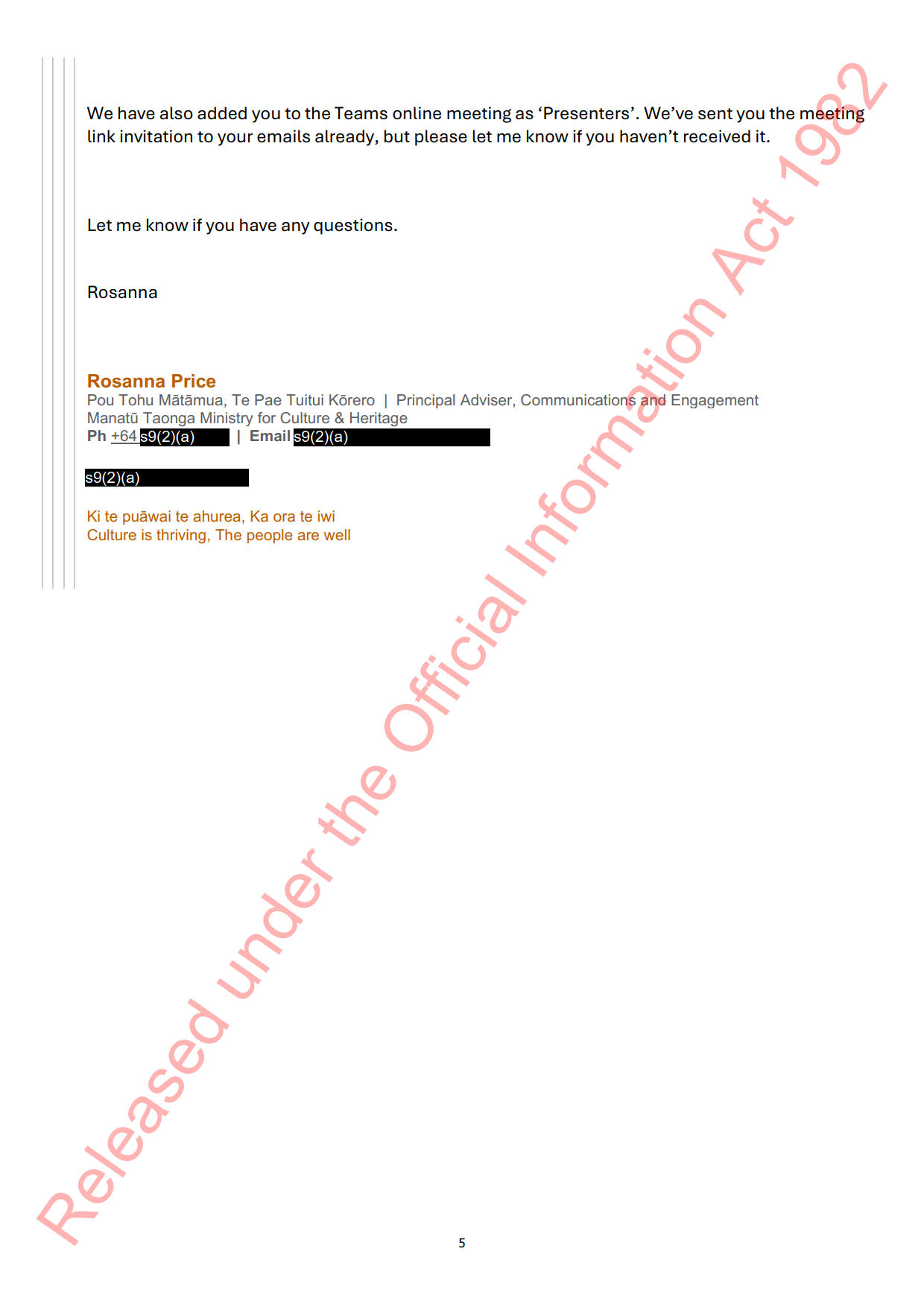
From:
Andrew Brookes
Sent:
Monday, 14 October 2024 5:41 pm
To:
Jack Bewley
Cc:
Oliver Powell; Amy Harrison
Subject:
FW: Names for consultation from Arts Access Aotearoa
Follow Up Flag:
Follow up
Flag Status:
Completed
Kia ora Jack
We have the names from Arts Access Aotearoa.
Cheers
Andy
From: s9(2)(a)
Sent: Monday, October 14, 2024 5:36 PM
To: Andrew Brookes <s9(2)(a)
>
Subject: Names for consultation from Arts Access Aotearoa
Kia ora Andy:
My apologies that these names are late – but ‘better than never’ I hope.
They are a combination of Arts Access Aotearoa’s specialist staff members who cover our sectors
and specialists from beyond our network that understand in the value of uniquely designed arts
events and projects that benefit health, rehabilitation and inclusion of marginalised communities
in community arts.
This is our list in order of preference. (I will be on leave in November so s9(2)(a)
and lead
Arts Access staff can represent us very well).
s9(2)(a)
Released under the Official Information Act 1982
1
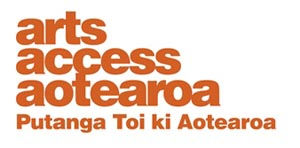
s9(2)(a)
Thank you for the opportunity to assist with your consultation.
Nāku noa, nā
s9(2)(a)
Executive Director
I Kaiwhakahaere Matua
With your help, all people in New Zealand, now and in the future can be included in the arts as artists or audience
members. Please donate at https://supporters-of-arts-access-aotearoa.raisely.com/
Arts Access Aotearoa|Putanga Toi ki Aotearoa
Level 3, Toi Pōneke Arts Centre|61-63 Abel Smith Street
P: PO Box 9828 | Wellington 6141
T: +64 4 802 4349| E: s9(2)(a)
W: www.artsaccess.org.nz
Find us on Facebook and Instagram. Join the e-news mailing list
Arts Access Aotearoa|Putanga Toi ki Aotearoa supports arts organisations and venues to increase their accessibility, builds the
capability and leadership skills of grass-roots community organisations providing arts opportunities to people with a disability, raises
public awareness about access to the arts and provides a national information service. It is also the lead organisation advocating for
the arts to be used as a rehabilitation tool for prisoners.
Released under the Official Information Act 1982
2
